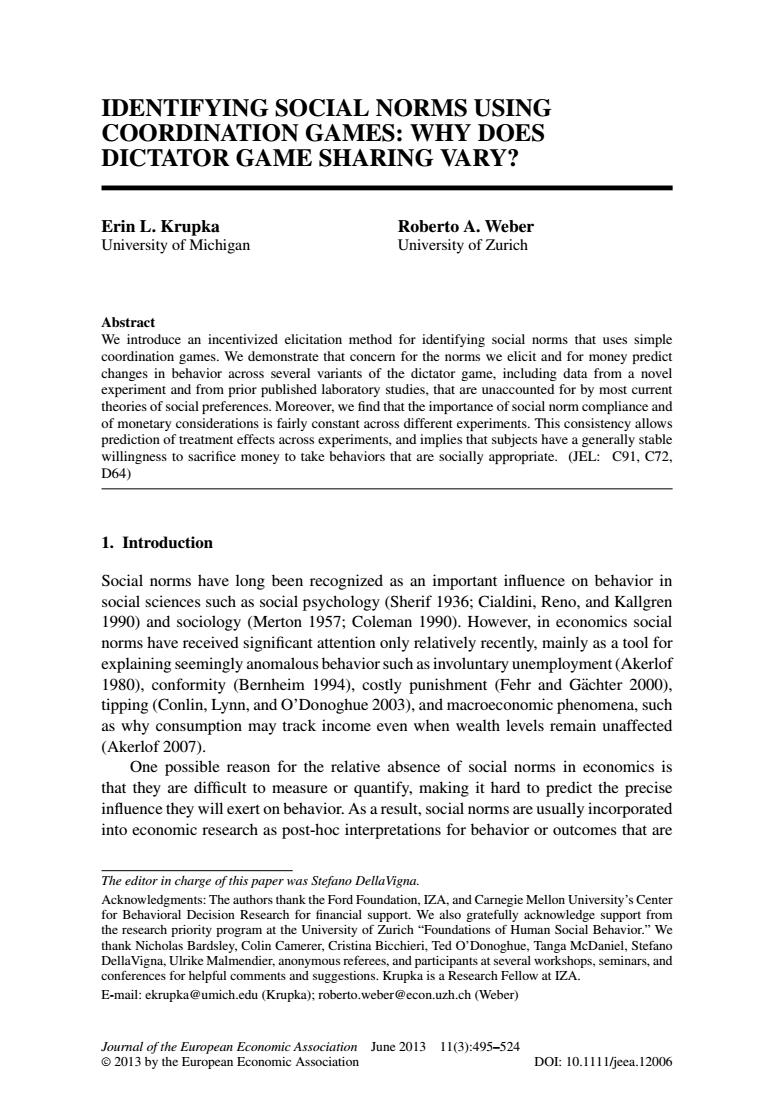正在加载图片...

IDENTIFYING SOCIAL NORMS USING COORDINATION GAMES:WHY DOES DICTATOR GAME SHARING VARY? Erin L.Krupka Roberto A.Weber University of Michigan University of Zurich Abstract we intr changes in behavior across seve eral variants of the dictator game.including data from a nove experiment and from prior published laboratory studies.that are unaccounted for by most curren theories of social pre eover,we find that norm compliance and willingness to sacrifice money to take behaviors that are socially appropriate.(JEL:C91.C72. D64) 1.Introduction Social norms have long been recognized as an important influence on behavior in social sciences such as social psychology (Sherif 1936;Cialdini.Reno,and Kallgren 9)and sociology(Merton 7:Coleman9).However in ec onomics norms have received significant attention only relatively recently,mainly as a tool fo explaining seemingly anomalous behavior such as involuntary unemployment(Akerlot 1980),conformity (Bernheim 1994),costly punishment (Fehr and Gachter 2000). tipping(Conlin,Lynn,and O'Donoghue 2003),and macroeconomic phenomena,such why consumption may track income even when wealth levels remain unaffected of2007 One possible reason for the relative absence of social norms in economics is that they are difficult to measure or quantify,making it hard to predict the precise influence they will exert on behavior.As a result,social norms are usually incorporated into economic research as post-hoc interpretations for behavior or outcomes that are The editor in charge of this paper was Stefano DellaVigna iversity's Cente ns of Human Soc e D: DellaVigna.Ulrike Malmendier.an mous referee and part nts a cral wor .seminars.and s for helpful co pka is a ch Fellow at IZA. E-mail:ekrupka@umich.edu (Krupka);roberto.weber@econ.uzh.ch (Weber) D010.1111jcea.12006 IDENTIFYING SOCIAL NORMS USING COORDINATION GAMES: WHY DOES DICTATOR GAME SHARING VARY? Erin L. Krupka University of Michigan Roberto A. Weber University of Zurich Abstract We introduce an incentivized elicitation method for identifying social norms that uses simple coordination games. We demonstrate that concern for the norms we elicit and for money predict changes in behavior across several variants of the dictator game, including data from a novel experiment and from prior published laboratory studies, that are unaccounted for by most current theories of social preferences. Moreover, we find that the importance of social norm compliance and of monetary considerations is fairly constant across different experiments. This consistency allows prediction of treatment effects across experiments, and implies that subjects have a generally stable willingness to sacrifice money to take behaviors that are socially appropriate. (JEL: C91, C72, D64) 1. Introduction Social norms have long been recognized as an important influence on behavior in social sciences such as social psychology (Sherif 1936; Cialdini, Reno, and Kallgren 1990) and sociology (Merton 1957; Coleman 1990). However, in economics social norms have received significant attention only relatively recently, mainly as a tool for explaining seemingly anomalous behavior such as involuntary unemployment (Akerlof 1980), conformity (Bernheim 1994), costly punishment (Fehr and Gachter 2000), ¨ tipping (Conlin, Lynn, and O’Donoghue 2003), and macroeconomic phenomena, such as why consumption may track income even when wealth levels remain unaffected (Akerlof 2007). One possible reason for the relative absence of social norms in economics is that they are difficult to measure or quantify, making it hard to predict the precise influence they will exert on behavior. As a result, social norms are usually incorporated into economic research as post-hoc interpretations for behavior or outcomes that are The editor in charge of this paper was Stefano DellaVigna. Acknowledgments: The authors thank the Ford Foundation, IZA, and Carnegie Mellon University’s Center for Behavioral Decision Research for financial support. We also gratefully acknowledge support from the research priority program at the University of Zurich “Foundations of Human Social Behavior.” We thank Nicholas Bardsley, Colin Camerer, Cristina Bicchieri, Ted O’Donoghue, Tanga McDaniel, Stefano DellaVigna, Ulrike Malmendier, anonymous referees, and participants at several workshops, seminars, and conferences for helpful comments and suggestions. Krupka is a Research Fellow at IZA. E-mail: ekrupka@umich.edu (Krupka); roberto.weber@econ.uzh.ch (Weber) Journal of the European Economic Association June 2013 11(3):495–524 c 2013 by the European Economic Association DOI: 10.1111/jeea.12006�